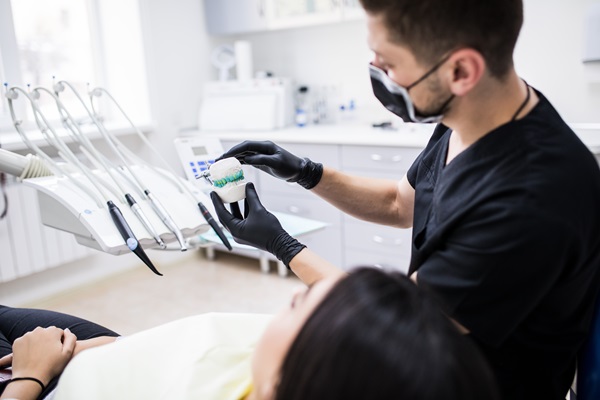A General Dentist Answers Bruxism FAQs

General dentists state that bruxism is a condition that involves the grinding of the top and bottom arches of teeth. The act often happens at night while a person is asleep, making it involuntary. However, some individuals are also known to grind their teeth during the day as well.
Although teeth grinding does not sound too serious, general dentists urge those who experience it to seek help. Continue reading to learn more about bruxism and how a general dentist can help. This information can be helpful to those who struggle with the condition.
Bruxism FAQs
Outlined below are some frequently asked questions and answers about bruxism. These are answered by a general dentist, who is the best person to refer to when it comes to dental problems.
1. Is bruxism harmful?
General dentists do recommend getting bruxism treated and managed as soon as it starts occurring. The jaw is very strong, but the constant act of grinding can result in problems with the teeth, gums, jaw, and even facial muscles if treatment is not administered. When bruxism first starts, it will not be extremely harmful. However, if a general dentist does not take action, the long-term effects can be permanent and dangerous to the oral cavity.
2. Does a general dentist treat bruxism?
Yes! General dentists are qualified and trained to treat bruxism. In most cases, the condition does not require the help of a specialist. In severe cases of bruxism, a general dentist may bring in someone to help with jaw exercises or speech therapy as the condition can lead to other problems. However, the first person to visit for bruxism is a general dentist.
3. What causes bruxism?
Bruxism is different for everyone, according to a general dentist. However, for the most part, it is caused by stress, changes in the jaw or teeth, or as a result of other dental conditions.
4. How is bruxism treated by a general dentist?
General dentists may recommend a few things for bruxism. It is important to review them in order to reach a resolution for the symptoms.
- Mouthguard or nightguard
- Muscle relaxers
- Bite splints
- Jaw exercises
5. Is bruxism permanent?
Not necessarily. A lot of individuals outgrow bruxism as it is based on the muscles of the face and jaw, both of which can change over time. Additionally, when a general dentist administers treatment for the condition, it helps to reduce the symptoms, which can ultimately make it temporary. This is not to say that this will be the case for everyone. Some individuals may experience bruxism for their entire life.
Talk to a general dentist about bruxism
Bruxism is a dental condition that general dentists can help with. Additionally, if there are any other questions past those that are answered above, talking to a dentist is the right step to take. To learn more about bruxism or how a general dentist can help, reach out today!
Request an appointment here: https://www.stratusdentalstudio.com or call Stratus Dental Studio at (630) 517-4304 for an appointment in our Carol Stream office.
Check out what others are saying about our dental services on Yelp: General Dentists in Carol Stream, IL.
Related Posts
Even though dentistry consists of many different services, you might be surprised to learn that many of them are performed by a general dentist. While certain specialists handle certain procedures, a regular dentist takes care of many of the more common or popular services.We have put together our list of the top 5 services offered…
It is natural for teeth to discolor over time. If you have noticed that your smile has lost its luster, a general dentist can help. For effective and long-lasting results, get personalized advice and treatment from the dentist in-office. However, there are general steps you can take to improve the whiteness of your smile. Below…
Clenching and grinding the teeth, also known as bruxism, can wear them down and cause jaw and ear pain. General dentists can help patients with bruxism avoid pain and discomfort. This blog will review the causes, symptoms, and treatments for teeth grinding.It is common for people to be unaware they clench or grind their teeth…
Maintaining good oral health is essential to a healthy lifestyle. Regular visits to a general dentist are crucial in preventing and treating different dental issues. General dentists provide a wide range of services, such as preventive care, restorative treatments, and oral health education. However, if you are new to an area or are changing dentists,…


